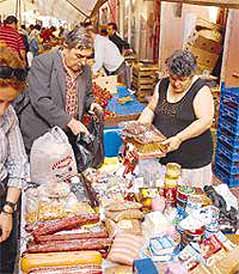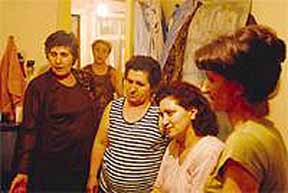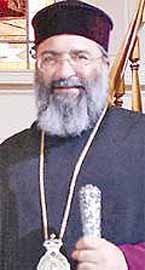|
|
The featured Aug. 6, 2006 article is from Turkey's "Hurriyet"
newspaper, written by Sefa Kaplan and Alin Ozinian; photos by Fatih Yalcin.
Here is the Turkish version.
Translated by Sukru Server Aya (with minor modifications in TAT), for
the web site of "Turkish Armenians."
Regarding this article, Erdal Firinci (of British European Turks) has written
in a Yahoo group that it is worthwhile remembering, "the problem is
with Dashnaks, Hunchaks and alike and never with ordinary Turks or Armenians
living in Turkey or abroad. There are countless examples of peaceful
co-existence of ordinary folks but this can not be said for the extremists
amongst us, so our struggle is with extremists. Turkish Armenians are citizens
of Anatolia just like any other Anatolian and carrying a Turkish passport or
not is not the issue but what we keep in our hearts is.. May his Eminence,
Mesrob II continue with his good work in bringing the two Anatolian
communities even closer."
|
|
|
| At
Kumkapi Every Wednesday, A Small Armenia is Set |
If on a Wednesday your stroll takes you to Kumkapi, you will see that several Armenian
citizens set up their benches and are trying to trade. The posters in the windows will
catch your attention. Most of some 40,000 Armenian citizens who came with a tourist visa
live in this part of the city. There is no argument of genocide or other political
subjects among them.
They are only trying to earn money and send little of that to their families. Even if they
arrive in hesitation and fear, sometime later they understand that Turks are not waiting
for them with saws in hand to "cut" them. When speaking, they did not hide their
names. Nonetheless, we are not disclosing names in this article.
 |
|
At
Istanbul's Kumkapi market |
The district open market set at Kumkapi, since a long time
has been adorned with merchandise benches opened by immigrants from Armenia. Most of them
are from Yerevan, the capital. Generally they are aged over 50 years. They are trying to
sell the few goods they brought from Armenia, cheap beads, suchuk, conjac, smoked fish,
caviar… Their purpose is to send some money to their children, grandchildren. Turks and
Kurds are the old customers, but the important buyers are again Armenians from Armernia.
Those doing well in their business, opened small shops near to the market place. There are
signs in Armenian and Turkish on their doors. We stroll the market place with Alin Ozinian,
who is making her doctorate degree study in Yerevan and knows Eastern Armenian dialect
well. At the beginning they get disturbed by the camera of Fatih, but later they invite us
to their shops and their market stands, welcoming us.
We really don’t know if their number reached 40.000 as the Foreign Minister Gul said,
but is apparent that they live in hard conditions in Istanbul.
|
The bad
comes not from the nation, but from the person
|
First we are guests to a typical house of Kumkapi, where the market is set. A. L. is
a construction engineer born in Gumru in 1946. After the break-up of the Soviet
Union he quit his profession and came to Turkey. He said, “The year was 1997, I
was living in the house of relatives; in the corner there was a stove. Our nation
does not know what a stove is; we are used to central heating. I lit the last
cigarette and threw the pack at the stove. When I asked of those around where the
other pack was, I received the answer that there was none. I felt strange and
decided immediately; I should have done something to save myself out of this
situation. I went to the bus station, 30 dollars was enough to come to Turkey; I
paid it and came here”.
A. L. lived on the streets for 17 days. Afterwards, he met an acquaintance in a
coffee house. With his help, A. L. first started to work in the factory of a Turkish
Armenian, and later did any job he could find. When he found the opportunity, he
brought along his wife as well. While Alin was doing the interpretation, all of a
sudden he starts to talk in broken Turkish. He says that his grandparents were
immigrants from Eastern Anatolia and adds ‘we already spoke Turkish at home”. He
shows the photos of their grandchildren on the wall and says “We are here for
them.”
His wife O. L. was setting a feast table in their poverty stricken house addressing
us as “canim” (my life). She says that she took house cleaning jobs, shows the
old chairs in the sitting rooms and says: “The Turkish woman I worked for gave
these to me. They give us gifts on their and our sacred holidays and ask if we are
short of anything. Sometimes, the Turks here treat us better than the local
Armenians. I am greatly thankful, they don’t make me feel like a stranger. Anyhow,
there are no bad nations, only bad persons.”
|
| My daughter was sick, I came but she died |
We had seen A. N. born in Yerevan, 1956, strolling the market. She was selling on her
little bench, rice, suchuk, smoked fish and some type of cream called “titvaser”. Her
little shop in the back drew our attention.
First she was reluctant to talk, then she explained.: “I came to Istanbul in 2000, I
sold my house to gain capital. I had to come because my daughter was very sick. I worked
hard, did any job I could find. I swept floors in restaurants, I washed dishes. Later I
opened a shop. Not all of the merchandise belongs to me. I sell whatever they bring for
sale.”
And was she having any problems with Turks? She said “I did not live any problems. They
don’t treat us badly. But of course my heart is in working in my home country. If I can
save some money, I will go back and buy a house. Since my daughter is dead, nothing is
important now, but life goes on”.
When leaving the tiny store, she tries to place in Alin's hand a box of Armenian candy.
Alin does not take it for she knows that what she calls “capital” is a little candy
and some smoked fish.
|
Retired teacher
from Yerevan, A.S.
They told us to say that we are NOT Armenian
|
I am 62 years old, I taught 33 years, we came to Turkey in 1992. My wife and I were
in the trading business. I was one of the three traders doing great business on
glassware in Armenia. Actually, the answer to the question “Why Turkey” is very
simple. This is the nearest and cheapest country for those who want to work. It is
easy to get a visa at the border, just pay 10 dollars.
When we were coming to Turkey, they had told us to introduce ourselves as Georgians.
For around two years we took that advice. Later we saw that Turks had no grudge
against Armenians, everyone minds his business. When trading, I had no problem at
all with other persons in business. Those who come from Armenia, work in the houses
of local Armenians from Istanbul. Some treat the workers as guests; on the other
hand there are some that don’t like Armenians from Armenia and would not give them
a job in their house. This is because many who come to Istanbul are peasants. The
Turkish Armenians would look at the Armenians from Armenia and say, “they are
rude, covetous, don’t know how to dress”.
The local Armenians look down upon those coming from Armenia and mistreat them. I am
sorry for that because it does not reflect our country totally. From time to time, I
have been faced with such cases that I am ashamed to say that I am from Armenia.
It's not nice to say, but there are some among them whom I would not take into my
house. Let me say this openly: I never had any problems with local Armenians or
Turks. I especially have never had a bad treatment, insult or annoyance from Turks.
I earlier hesitated to say that I was Armenian, but now I am at ease.
|
| How
can 32 persons fit and live in this house? |
In a street near to the Kumkapi pubs, we enter a house which looks to have three
floors. Inside it is only a shelter. Rooms are separated with curtains, and the
poverty is full fledged. Spaghetti is cooking on a picnic butane cooker. Despite
this, the walls are adorned with pictures of Christ and Mary.
 |
|
The
Armenian ladies from the top floor
|
The woman on the first floor did not want to
talk because her son did not permit her. The second floor was empty. On the top
floor we see about three to five women, trying to fit on a small mattress .Among
them, V. T. agrees to speak.
Her real profession is bookkeeping. Born in Leninakan in 1955, lives in Turkey since
2003. Reason of coming: “There was no job, and need of money, Turkey was the
nearest country and I came here." First she baby sat the child of an Armenian
family. Now she works daily as a house cleaner. “I took care of the baby as if the
baby were my own and every time I took the child in my lap I begged God to have my
children taken care of in the same manner.” When she first arrived, she was
treated roughly by both Turks and Armenians. V. T. said : “they like to look down
upon us; they don’t think that once I was too a lady of my house, I had a job, but
now I have none; some day the same can happen to them. But I still don’t want any
one to live what I have been through.”
V. T. gave courage for N. F. to speak as well. Born in Leninakan in 1948, came to
Turkey in 2000. She also works in houses as a maid. With all sincerity she says: “Turks
are very good people, I never saw any harm from them”. Referring to a house where
no one would walk in under normal conditions, she says there were exactly 32
Armenian nationals living.
While getting out of the poverty district and walking toward the Armenian
Patriarchate we think of other immigrants spread throughout the world, to have
better way of life and to fill their stomachs. We think of immigrants drowned in the
Maritsa River while dreaming of Europe; those dropped on no man's islands in the
Aegean or those women and children from North Africa drowned while trying to reach
Spain.
What was the poet Behcet Nercatigil saying?
“When values are dead I will have died as well”
|
Patriarch of Turkish-Armenians, Mesrob II
Among them, there are some that marry Turks |
How your relations with those coming from Armenia? Are thery
coming to you when they have problems?
 |
|
His
Eminence, Mesrob II. |
- Until the last two-three years, they were coming mostly for
financial aid. We were investigating and if they were, for example, really stuck and had
no money to go back, we were helping them with travel money. But later we found out that
they were getting out of the bus in Samsun and Trabzon and were coming back to Istanbul.
We decided to no longer provide financial help. But the church is the meeting place for
them. On Sundays, the Kumkapi Church is filled with Armenians from Armenia.
Is the Patriarchate a factor for their chosing Kumkapi ?
- No, this is one of the cheapest districts of Istanbul.
What is their basic problem ?
- First, having a visa. Aside from that, their children have a schooling problem. Those
who live here and have good jobs are unable to send their children to school. This is the
greatest problem for those who arrived as a family.
How is the educational profile ?
- Almost all of them are institute graduates but cannot find a job. There are even doctors
among them. They take care of sick ones in homes as though maids, and they earn more money
than in Armenia.
How are their relations with Turks ?
- Their relations are very good. Anyway, the key of every problem is education and
economy. If the exchange of students can be achieved, many things will change and human
relations will resolve everything. You may scold persons you don’t know or ever met, but
you won’t do the same with someone you know.
Are there those complaining about bad treatment or other
complaints?
- As far as I can see, every one gets along very fine. There are some that even marry
Turks.
Does the local Armenian community feel discomfort with those
coming from Armenia?
- More than discomfort there is lack of confidence. The Armenian community does not trust
these people, they say “You cannot trust their word, they make promises they don’t
fulfill.”
Related:
Armenian-Turks Today
|
|